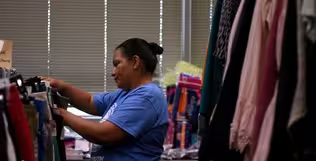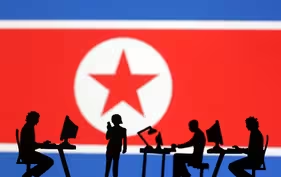
What the U.S. has accomplished in 250 years of innovation
Clip: 7/5/2025 | 6m 32sVideo has Closed Captions
What the U.S. has accomplished in 250 years of innovation and what’s next
President Donald Trump went to Iowa on Thursday to start the countdown to the nation’s 250th Independence Day next year. To mark the anniversary, the nonpartisan Center for the Study of the Presidency and Congress is looking at 250 years of U.S. innovation. John Yang speaks with Glenn Nye, the center’s president and CEO, about the project.
Problems playing video? | Closed Captioning Feedback
Problems playing video? | Closed Captioning Feedback
Major corporate funding for the PBS News Hour is provided by BDO, BNSF, Consumer Cellular, American Cruise Lines, and Raymond James. Funding for the PBS NewsHour Weekend is provided by...

What the U.S. has accomplished in 250 years of innovation
Clip: 7/5/2025 | 6m 32sVideo has Closed Captions
President Donald Trump went to Iowa on Thursday to start the countdown to the nation’s 250th Independence Day next year. To mark the anniversary, the nonpartisan Center for the Study of the Presidency and Congress is looking at 250 years of U.S. innovation. John Yang speaks with Glenn Nye, the center’s president and CEO, about the project.
Problems playing video? | Closed Captioning Feedback
How to Watch PBS News Hour
PBS News Hour is available to stream on pbs.org and the free PBS App, available on iPhone, Apple TV, Android TV, Android smartphones, Amazon Fire TV, Amazon Fire Tablet, Roku, Samsung Smart TV, and Vizio.
Providing Support for PBS.org
Learn Moreabout PBS online sponsorshipJOHN YANG: This week, President Trump went to Iowa in America's heartland to start the countdown to the nation's 250th Independence Day next year.
To mark the anniversary, the nonpartisan Center for the Study of the Presidency and Congress is looking at 250 years of U.S. innovation.
Earlier, I spoke with Glenn Nye, the Center's president and CEO.
Mr. Nye, why innovation?
Why pick that as the topic?
GLENN NYE, Center for the Study of the Presidency in Congress: Well, thanks for having me, John.
We started thinking about this project about a year ago.
We really wanted to root our work on this idea that the arc of the American story over the first 250 years really is a story of innovation and renewal.
The country was founded on somewhat innovative principles at the time, but they knew they wanted to create a more perfect union, a union that would get better and better over time as we refreshed, as we revisited, as we innovated on those founding moments.
JOHN YANG: So what sorts of innovations are we talking about?
GLENN NYE: Well, we're focused on a couple of sets of innovation, one in science and technology and the other in democracy.
And what we wanted to start with first, John, was we created a set of modules called Life in 1776, which we featured on our website.
All these aspects of just regular life back in 1776 that help us ground the beginning of the story.
But then we wanted to look at the arc of the 250 years since we wanted to look at innovations in science and technology.
So we started looking at things, everything from Benjamin Franklin's bifocals through to assembly lines and interchangeable parts, all the way through to modern technologies like cell phones and genetic sequencing and even ChatGPT.
And we created a visual timeline on our website where Americans can go and reflect on how these innovations have kind of built on each other over time.
Soon we're going to release a new timeline which is going to include innovations in democracy.
So taking the starting point back from the Constitution and the creation of the Bill of Rights and all the way through those changes over time, like the increase in voting rights and civil rights, some of the ones that are better known, but also some things that aren't as well known, like political primaries and partisan primaries, up to recent innovations where American states now are trying to figure out replacing those primaries with primaries that are open to all voters in an effort to try to innovate, to make our political system less dysfunctional and more representative.
JOHN YANG: Are there ways that the American character, both of the country and of the people, have affected or shaped the innovations?
And on the other side, have the innovations shape the American character?
GLENN NYE: I think they really have -- I think what we -- what one will get out of looking at our reflective timelines on innovation is this notion that America is pretty special and unique in many ways.
And I think what's really interesting about the United States is we've made investments that have benefited us greatly in education and access to information, and also a culture that just promotes risk taking and allows for innovations to be rewarded, whether it's through patents or commercial success or just celebration by the community.
JOHN YANG: Continual improvement the United States is a work in progress?
GLENN NYE: It is a work in progress.
And I think one of the most important lessons of this project that we're hoping Americans will take away is when we look back over this timeline of improvement, innovation, not simply to accept the greatness of the things that were done by our forebears and those who have created innovations over the 250-year arc, but actually to take that as a challenge to ourselves today as modern American citizens, to look back at the really amazing innovations, those that came before us made, and charge ourselves with the responsibility to take the project forward, to use that as inspiration to continue that series of innovations such that the United States could earn another amazing 250 years to the story.
JOHN YANG: The last big milestone, of course, was the bicentennial in 1976.
You talk about renewal, it came on the heels of Watergate, sort of a stress test for American democracy.
How would you assess the state of American democracy as we approach the 250th?
GLENN NYE: Well, I think stress test is a word that applied back in the 1976 era, and it's definitely a word that applies now.
There's a lot of anxiety and consternation over where our particularly arc of democracy has brought us and where it's going.
And I think there's good reason for concern and a lot of consternation and conversation about where we should go from here.
But it's our sincere hope that the consternation isn't the end of the story here.
You know, we don't want our story to end and stagnate at the 250th year of the story.
We want to take this as an opportunity to talk about those consternations, to visit with each other as Americans about where we can improve.
And also, I think it's important, the reflection over time of the history of our country reminds us that change is a regular part of the history of this country.
There was no time at which we stopped innovating and changing.
And we have to go and use those examples to help us in a conversation today about what we can do as citizens to do better.
And the good news is there are all sorts of ideas being tried throughout the country.
Science and technology, technological innovations are happening all the time, but also innovations in democracy.
And so it's on us as citizens to say, okay, things might not be perfect, but can we as a country pull ourselves together as we've done in the past, and make improvements and try to keep that arc of innovation and progress going?
And I think the reality is we absolutely can, as long as we take that responsibility as citizens to make those changes real.
JOHN YANG: Glenn Nye, the Center for the Study of Presidency in Congress.
Thank you very much.
GLENN NYE: Thank you, John.
Pleasure being with you.
News Wrap: Rescuers search for missing after Texas floods
Video has Closed Captions
Clip: 7/5/2025 | 3m 43s | News Wrap: Rescuers urgently search for missing after deadly Texas floods (3m 43s)
What’s behind a thrifting boom among American shoppers
Video has Closed Captions
Clip: 7/5/2025 | 7m 43s | What’s behind a thrifting boom among American shoppers (7m 43s)
Why North Korean operatives are infiltrating U.S. companies
Video has Closed Captions
Clip: 7/5/2025 | 5m 29s | How North Korean operatives are infiltrating U.S. companies to fund weapons programs (5m 29s)
Providing Support for PBS.org
Learn Moreabout PBS online sponsorshipSupport for PBS provided by:
Major corporate funding for the PBS News Hour is provided by BDO, BNSF, Consumer Cellular, American Cruise Lines, and Raymond James. Funding for the PBS NewsHour Weekend is provided by...














